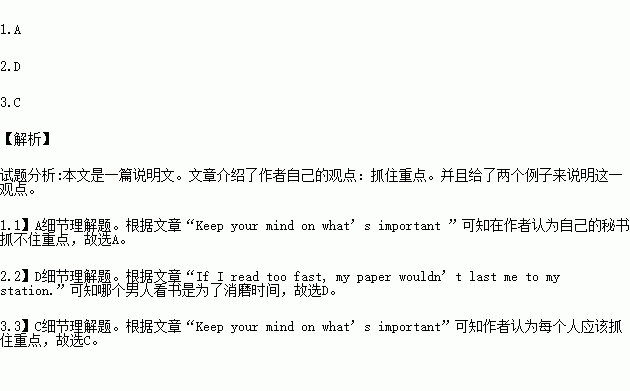题目内容
“Keep your eyes on the ball.” That is good advice when you are on the playing field, and good advice for everyday life. “Keep your mind on what’s important,” is the way I’d put it. But people are funny. They think too much about the details.
I had a secretary once. She was very hardworking. I ran a school and people used to call up to enroll(登记) for courses. Berry used to get angry at the phone. “If they keep on ringing, I’ll never get my typing done!” she’d shout.
People just don’t see the big picture. One evening, after leaving work, I was sitting next to a man on the train. I was feeling tired. My eyes fell on the paper he had spread out in front of him. You know how you feel to read over someone’s shoulder?
I read the page and leaned back. I guessed I was waiting for him to turn it. After a while, I realized—he wasn’t turning the page. He just kept on reading.
Now if you knew the page he was reading, you’d know that there weren’t many words on the page to read anyway. The layout(版面) was mostly pictures. So I turned to the man and said,” You know, you really read very slowly.”
“What do you mean?” he asked. “Well,” I told him, “I read the page in about a minute, and you have taken about ten. And you are still reading. You know,” I went on “If you learned to read faster, you could get more reading done.” He remained silent for a minute or two. “If I read too fast, my paper wouldn’t last me to my station.”
1.The writer wasn’t satisfied with his secretary because ___.
A. she didn’t put first thing first
B. she was too busy
C. she was easy to get angry
D. she couldn’t finish her work on time
2.The man read newspaper in order to___.
A. take in information B. enjoy pictures
C. save time D. kill time
3.The writer thinks that people seem to need a sense of ___.
A. what to read first B. how to read fast
C. what is important D. what is funny
 亮点激活精编提优100分大试卷系列答案
亮点激活精编提优100分大试卷系列答案
